外研版(2019)选择性必修 第一册Unit 5 Revealing nature Using language课件(共21张PPT)
文档属性
| 名称 | 外研版(2019)选择性必修 第一册Unit 5 Revealing nature Using language课件(共21张PPT) | 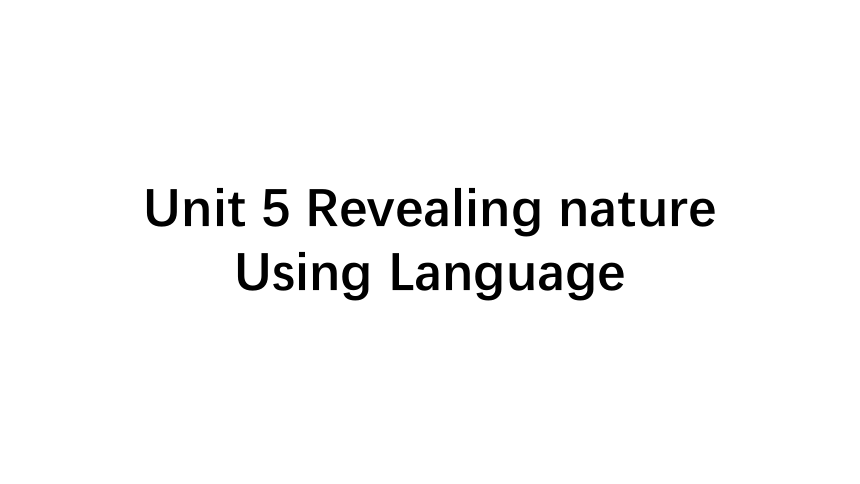 | |
| 格式 | pptx | ||
| 文件大小 | 700.9KB | ||
| 资源类型 | 教案 | ||
| 版本资源 | 外研版(2019) | ||
| 科目 | 英语 | ||
| 更新时间 | 2023-10-26 16:15:49 | ||
图片预览

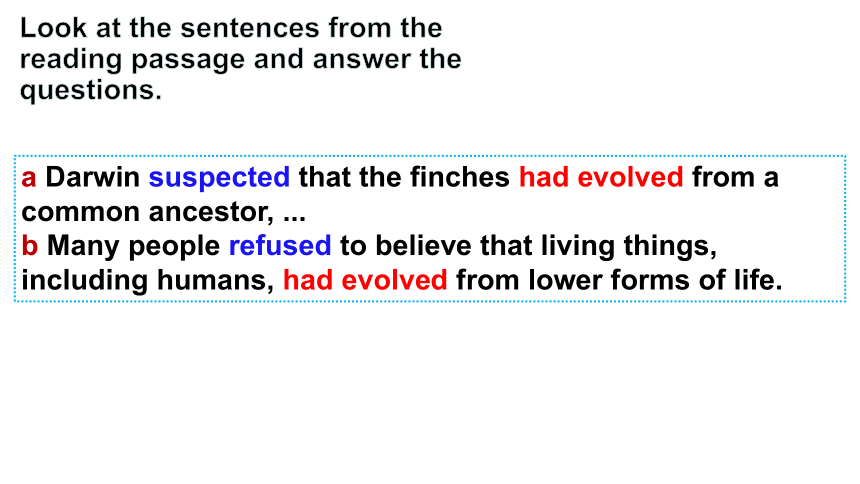
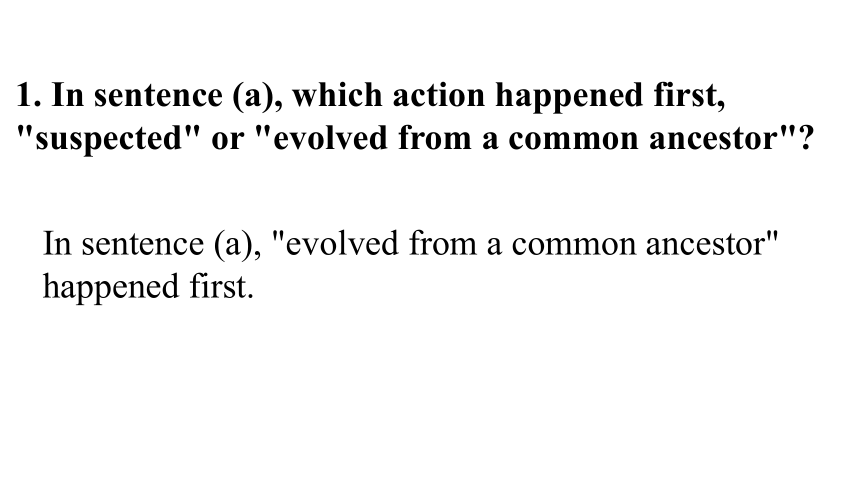
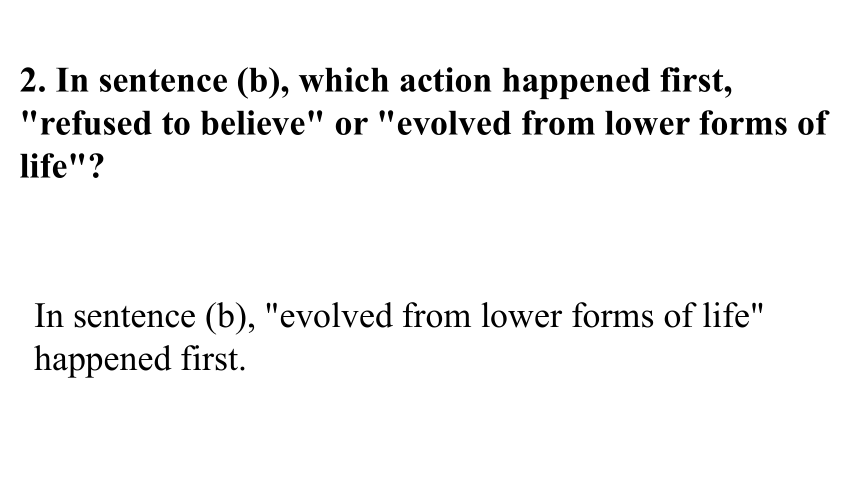
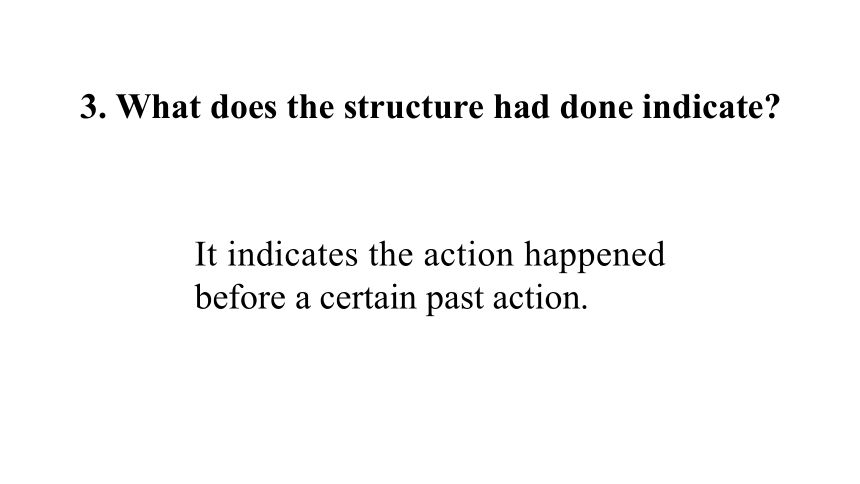
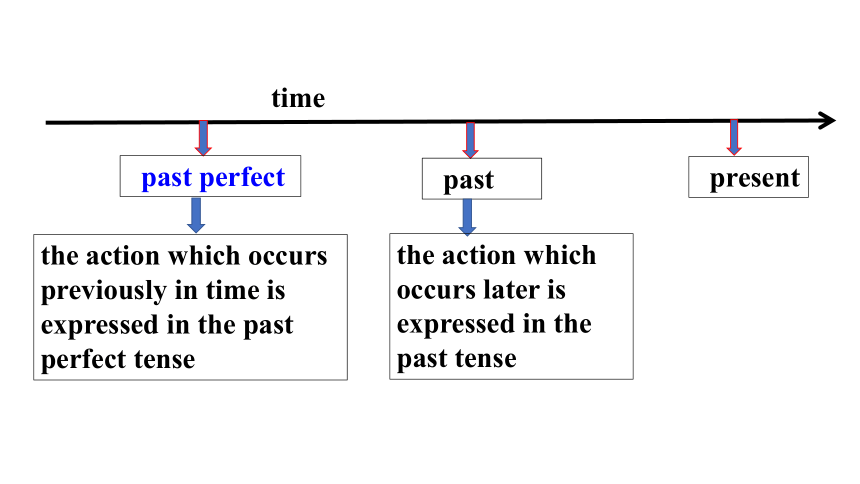
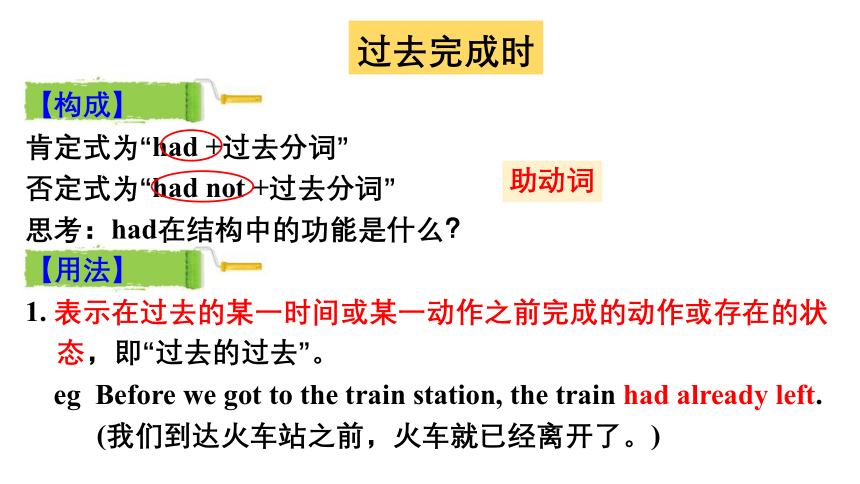
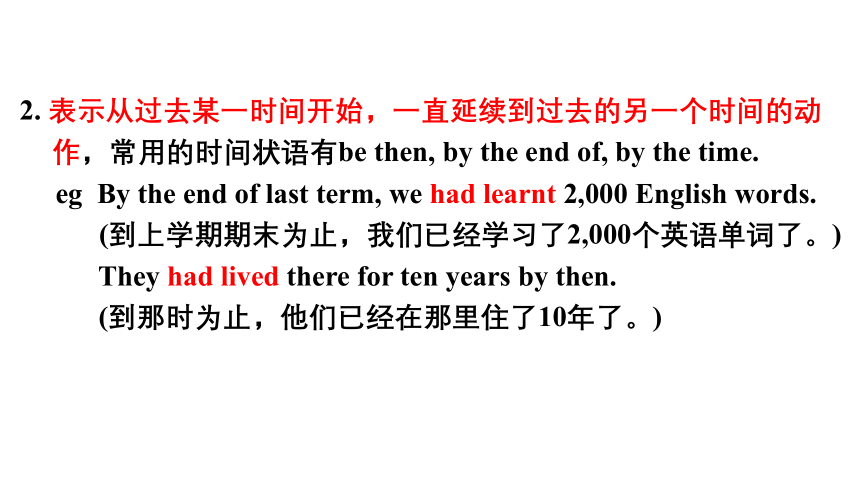
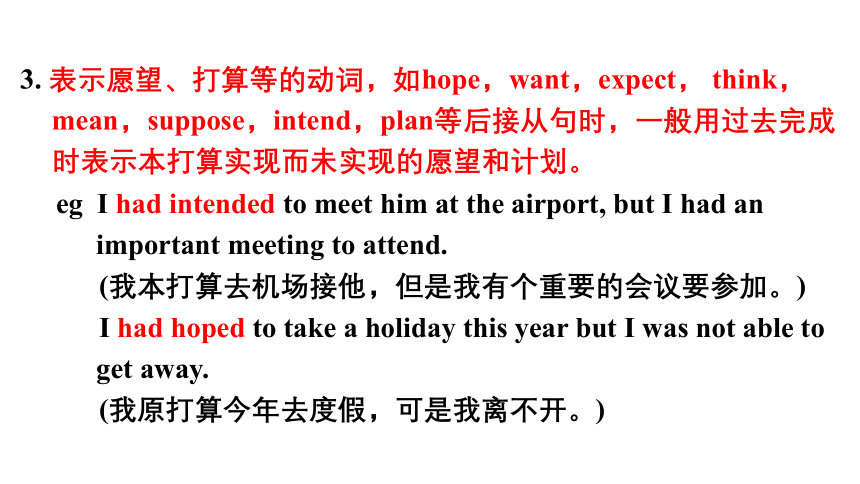
文档简介
(共21张PPT)
Unit 5 Revealing nature
Using Language
Look at the sentences from the reading passage and answer the questions.
a Darwin suspected that the finches had evolved from a common ancestor, ...
b Many people refused to believe that living things, including humans, had evolved from lower forms of life.
1. In sentence (a), which action happened first, "suspected" or "evolved from a common ancestor"
In sentence (a), "evolved from a common ancestor" happened first.
2. In sentence (b), which action happened first, "refused to believe" or "evolved from lower forms of life"
In sentence (b), "evolved from lower forms of life" happened first.
3. What does the structure had done indicate
It indicates the action happened before a certain past action.
present
past
past perfect
time
the action which occurs previously in time is expressed in the past perfect tense
the action which occurs later is expressed in the past tense
【构成】
肯定式为“had +过去分词”
否定式为“had not +过去分词”
思考:had在结构中的功能是什么?
【用法】
1. 表示在过去的某一时间或某一动作之前完成的动作或存在的状态,即“过去的过去”。
eg Before we got to the train station, the train had already left.
(我们到达火车站之前,火车就已经离开了。)
助动词
过去完成时
2. 表示从过去某一时间开始,一直延续到过去的另一个时间的动作,常用的时间状语有be then, by the end of, by the time.
eg By the end of last term, we had learnt 2,000 English words.
(到上学期期末为止,我们已经学习了2,000个英语单词了。)
They had lived there for ten years by then.
(到那时为止,他们已经在那里住了10年了。)
3. 表示愿望、打算等的动词,如hope,want,expect, think,mean,suppose,intend,plan等后接从句时,一般用过去完成时表示本打算实现而未实现的愿望和计划。
eg I had intended to meet him at the airport, but I had an important meeting to attend.
(我本打算去机场接他,但是我有个重要的会议要参加。)
I had hoped to take a holiday this year but I was not able to get away.
(我原打算今年去度假,可是我离不开。)
5. 过去完成时还可用于一些固定句型:
◆It / This / That was + the first / second ... + time + that从句,从句谓语常用过去完成时。
eg It was the first time that we had been to Chicago.
◆It was + 一段时间+ since从句,从句谓语用过去完成时。
eg It was two years since he had joined the army.
Supplementary explanation
现在完成时与过去完成时的区别
现在完成时 过去完成时
站在“现在”的角度回顾过去,表示一个从过去持续到现在的动作或事件,对现在仍有影响 站在“过去”的角度回顾一个更远的过去,强调“过去的过去”。只有和过去的某个时间或某个动作相比较时,才用到它。
have (has) + 过去分词 had +过去分词
时间状语常用today, this week, this year, recently等 时间状语常用by, by the end of, by the time, before, when等构成的短语或从句
eg We have lived here for ten years.
We had lived here for ten years when we had to move last year.
I have learnt 2,000 English words so far.
I had learnt 2,000 English words till then.
Have you read the newspaper today
By the end of August, they had treated over 5,000 patients.
一般过去时与过去完成时的区别
一般过去时 过去完成时
只强调过去某一特定的时间 在时间上强调“过去的过去”
当两个或两个以上接连发生的动作用 and 或 but 连接时,按时间顺序,只需用一般过去时 在 after , as soon as 引导的从句中,由于这些连词本身已经表示出时间的先后,因此也可以用过去时来代替过去完成时
在没有明确的过去时间状语作标志时,谓语动词所表示的动作发生的时间先后须依据上下文来判断:先发生的用过去完成时,后发生的则用一般过去时。
eg They had arrived at the station by ten yesterday.
They arrived at the station at ten yesterday.
He entered the room, turned on the light and read an evening paper.
She was very happy. Her whole family were pleased with her, too. She had just won the first place in the composition competition.
began
had led to
developed
chose to
had made
Complete the paragraphs with the information from the given sentences. The sentences are in the order in which they happened. They can help you to decide the use of tenses.
had introduced
competed
arrived
had lived
eaten
declined
Work in pairs. Act out a role-play using the information in Activity 3. One of you will play the keeper of Lonesome George, and the other will play the reporter asking about George. Use the past perfect tense where appropriate.
根据句意,给出decline的意思。
1) The sales declined.
2) The first signs of economic decline became visible.
3) I invited her to join us, but she declined.
v.下降
n. 衰退
v. 拒绝
1. decline v. : to decrease in quantity or importance
减少,降低
n. a decrease in the quality, quantity, or importance of something 衰落,没落; 减少,削减
blame v. to say or think that sb or sth is responsible for sth bad
责怪,指责;把……归咎于
2. The extinction of the Pinta Island tortoise is blamed on humans.
eg I don’t blame Jack for the mistake.
blame …for 因…责怪
Whenever something goes wrong, everyone blames it on me.
blame …on 归咎于
Which driver was to blame for the accident
be to blame 应受……的责怪(已经含有“受责怪”的意思,不用被动)
Last Sunday, I (1) _____________ (intend) to go for an outing, but it (2)________(begin) to rain early in the morning. So I went to the movies with my boy friend. By the time I (3)_______(get) up, my dog (4)___________(eat) all my breakfast on the table. Then I went to see the film, hungry, but when I (5) ________(arrive) at the cinema, the film (6)__________(be) on for 20 minutes.
A
had intended
began
got
had eaten
arrived
Fill in the blanks.
had been
It was the first time that I (7)__________(see) a film with my boy friend and it was the most interesting movie that I (8)____________ (watch)! Hardly (9)______I _______(get) out of the cinema when I met some friends. We had dinner and talked happily. But when I was going to pay, I found my wallet and mobile phone (10)______________(steal). What an unlucky day!
had seen
had watched
had got
had been stolen
Unit 5 Revealing nature
Using Language
Look at the sentences from the reading passage and answer the questions.
a Darwin suspected that the finches had evolved from a common ancestor, ...
b Many people refused to believe that living things, including humans, had evolved from lower forms of life.
1. In sentence (a), which action happened first, "suspected" or "evolved from a common ancestor"
In sentence (a), "evolved from a common ancestor" happened first.
2. In sentence (b), which action happened first, "refused to believe" or "evolved from lower forms of life"
In sentence (b), "evolved from lower forms of life" happened first.
3. What does the structure had done indicate
It indicates the action happened before a certain past action.
present
past
past perfect
time
the action which occurs previously in time is expressed in the past perfect tense
the action which occurs later is expressed in the past tense
【构成】
肯定式为“had +过去分词”
否定式为“had not +过去分词”
思考:had在结构中的功能是什么?
【用法】
1. 表示在过去的某一时间或某一动作之前完成的动作或存在的状态,即“过去的过去”。
eg Before we got to the train station, the train had already left.
(我们到达火车站之前,火车就已经离开了。)
助动词
过去完成时
2. 表示从过去某一时间开始,一直延续到过去的另一个时间的动作,常用的时间状语有be then, by the end of, by the time.
eg By the end of last term, we had learnt 2,000 English words.
(到上学期期末为止,我们已经学习了2,000个英语单词了。)
They had lived there for ten years by then.
(到那时为止,他们已经在那里住了10年了。)
3. 表示愿望、打算等的动词,如hope,want,expect, think,mean,suppose,intend,plan等后接从句时,一般用过去完成时表示本打算实现而未实现的愿望和计划。
eg I had intended to meet him at the airport, but I had an important meeting to attend.
(我本打算去机场接他,但是我有个重要的会议要参加。)
I had hoped to take a holiday this year but I was not able to get away.
(我原打算今年去度假,可是我离不开。)
5. 过去完成时还可用于一些固定句型:
◆It / This / That was + the first / second ... + time + that从句,从句谓语常用过去完成时。
eg It was the first time that we had been to Chicago.
◆It was + 一段时间+ since从句,从句谓语用过去完成时。
eg It was two years since he had joined the army.
Supplementary explanation
现在完成时与过去完成时的区别
现在完成时 过去完成时
站在“现在”的角度回顾过去,表示一个从过去持续到现在的动作或事件,对现在仍有影响 站在“过去”的角度回顾一个更远的过去,强调“过去的过去”。只有和过去的某个时间或某个动作相比较时,才用到它。
have (has) + 过去分词 had +过去分词
时间状语常用today, this week, this year, recently等 时间状语常用by, by the end of, by the time, before, when等构成的短语或从句
eg We have lived here for ten years.
We had lived here for ten years when we had to move last year.
I have learnt 2,000 English words so far.
I had learnt 2,000 English words till then.
Have you read the newspaper today
By the end of August, they had treated over 5,000 patients.
一般过去时与过去完成时的区别
一般过去时 过去完成时
只强调过去某一特定的时间 在时间上强调“过去的过去”
当两个或两个以上接连发生的动作用 and 或 but 连接时,按时间顺序,只需用一般过去时 在 after , as soon as 引导的从句中,由于这些连词本身已经表示出时间的先后,因此也可以用过去时来代替过去完成时
在没有明确的过去时间状语作标志时,谓语动词所表示的动作发生的时间先后须依据上下文来判断:先发生的用过去完成时,后发生的则用一般过去时。
eg They had arrived at the station by ten yesterday.
They arrived at the station at ten yesterday.
He entered the room, turned on the light and read an evening paper.
She was very happy. Her whole family were pleased with her, too. She had just won the first place in the composition competition.
began
had led to
developed
chose to
had made
Complete the paragraphs with the information from the given sentences. The sentences are in the order in which they happened. They can help you to decide the use of tenses.
had introduced
competed
arrived
had lived
eaten
declined
Work in pairs. Act out a role-play using the information in Activity 3. One of you will play the keeper of Lonesome George, and the other will play the reporter asking about George. Use the past perfect tense where appropriate.
根据句意,给出decline的意思。
1) The sales declined.
2) The first signs of economic decline became visible.
3) I invited her to join us, but she declined.
v.下降
n. 衰退
v. 拒绝
1. decline v. : to decrease in quantity or importance
减少,降低
n. a decrease in the quality, quantity, or importance of something 衰落,没落; 减少,削减
blame v. to say or think that sb or sth is responsible for sth bad
责怪,指责;把……归咎于
2. The extinction of the Pinta Island tortoise is blamed on humans.
eg I don’t blame Jack for the mistake.
blame …for 因…责怪
Whenever something goes wrong, everyone blames it on me.
blame …on 归咎于
Which driver was to blame for the accident
be to blame 应受……的责怪(已经含有“受责怪”的意思,不用被动)
Last Sunday, I (1) _____________ (intend) to go for an outing, but it (2)________(begin) to rain early in the morning. So I went to the movies with my boy friend. By the time I (3)_______(get) up, my dog (4)___________(eat) all my breakfast on the table. Then I went to see the film, hungry, but when I (5) ________(arrive) at the cinema, the film (6)__________(be) on for 20 minutes.
A
had intended
began
got
had eaten
arrived
Fill in the blanks.
had been
It was the first time that I (7)__________(see) a film with my boy friend and it was the most interesting movie that I (8)____________ (watch)! Hardly (9)______I _______(get) out of the cinema when I met some friends. We had dinner and talked happily. But when I was going to pay, I found my wallet and mobile phone (10)______________(steal). What an unlucky day!
had seen
had watched
had got
had been stolen
